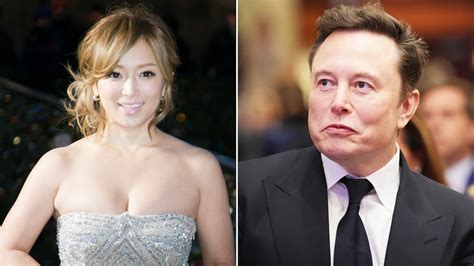
J-Pop star Kano, also known as ‘Pii-chan,’ has publicly refuted rumors linking her to Elon Musk as the mother of his child, definitively stating she has never met the billionaire. The denial follows widespread speculation fueled by online conspiracy theories and unsubstantiated claims.
Kano addressed the swirling rumors during a recent broadcast, firmly stating, “I have never met Elon Musk, given birth to his child, or received money from him.” The statement, reported by Yahoo Entertainment, aimed to quash the unfounded allegations that began circulating online, propelled by questionable social media posts and speculative articles.
The rumors gained traction in certain online communities, particularly those prone to conspiracy theories, where users connected unrelated information to suggest a hidden relationship between Kano and Musk. These theories frequently cited the singer’s relative obscurity outside of Japan and her occasional absences from social media as supposed “evidence” of a secret arrangement with the tech mogul. The narrative was further amplified by the use of AI-generated images and manipulated videos, adding a layer of false credibility to the claims.
Kano’s direct denial serves as a critical response to the misinformation campaign. It underscores the dangers of unchecked speculation and the ease with which false narratives can spread online. The incident also highlights the potential for celebrities and public figures to be targeted by baseless rumors, particularly in the age of social media and artificial intelligence.
The J-Pop star’s clarification comes as Musk himself faces scrutiny regarding the size of his family, which has expanded rapidly in recent years. This context likely contributed to the rumor’s initial virality, as any new report of a child associated with Musk draws immediate and intense attention.
The false rumors linking Kano to Elon Musk underscore the darker side of internet culture, where misinformation can rapidly escalate and impact individuals’ lives. Her decisive response is a step towards reclaiming her narrative and combating the spread of unsubstantiated claims. The situation serves as a cautionary tale about the importance of critical thinking and fact-checking in the digital age.
Background and Development of the Rumor
The internet is a fertile ground for rumors, and in the case of Kano and Elon Musk, the conditions were ripe for speculation to blossom into a full-blown conspiracy theory. Several factors contributed to the rumor’s development. First, Elon Musk’s personal life is a frequent subject of media attention, particularly his growing number of children. This inherent interest makes any association with him newsworthy, regardless of its veracity.
Second, the relatively low profile of Kano outside of Japan provided an opportunity for misinformation to take root. Because she is not a household name in Western countries, there was less readily available information to debunk the claims. This lack of immediate verification allowed the rumors to spread unchecked for a period.
Third, the power of social media and online forums cannot be understated. Platforms like X (formerly Twitter), Reddit, and various online conspiracy theory communities provided avenues for the rumors to be amplified. Algorithms often prioritize engagement over accuracy, meaning that sensational and outlandish claims can quickly gain traction, even if they are demonstrably false. The anonymity afforded by some online platforms can also embolden individuals to spread misinformation without fear of accountability.
The rumor likely started with a few speculative posts, possibly on obscure online forums or social media groups. These initial posts may have contained distorted or fabricated information, possibly accompanied by manipulated images or videos. As these posts gained attention, they were shared more widely, eventually reaching larger audiences.
The use of AI-generated content further complicated matters. Deepfake technology has made it increasingly easy to create realistic-looking images and videos that can be used to spread misinformation. In the case of Kano and Elon Musk, it is possible that AI-generated content was used to fabricate evidence of a relationship, further fueling the rumors.
The spread of the rumor highlights the importance of media literacy in the digital age. Individuals need to be able to critically evaluate the information they encounter online and distinguish between credible sources and unreliable ones. Fact-checking websites and journalistic organizations play a crucial role in debunking false claims and providing accurate information.
Kano’s Response and Its Impact
Kano’s decision to directly address the rumors was a necessary step in combating the misinformation campaign. By publicly denying the allegations, she reclaimed her narrative and provided a clear and authoritative statement to counter the false claims. Her response was widely reported by news outlets, both in Japan and internationally, which helped to amplify her message and debunk the rumors.
Her denial had several important impacts. First, it helped to clarify the situation for the general public and prevent the rumors from spreading further. Many people who had encountered the rumors online were likely unsure of their veracity. Kano’s statement provided them with definitive information and helped to dispel any doubts.
Second, her response sent a message to those who were spreading the rumors that their actions had consequences. By publicly calling out the misinformation, she discouraged others from engaging in similar behavior. It also highlighted the potential harm that can be caused by spreading false information online.
Third, Kano’s actions empowered other potential targets of online rumors. By standing up for herself and speaking out against the misinformation, she demonstrated that it is possible to fight back against false claims and reclaim one’s narrative. Her example may inspire others to do the same if they find themselves in a similar situation.
Kano’s response was also a testament to the importance of public figures using their platforms to combat misinformation. Celebrities and influencers have a large audience and a significant amount of influence. When they use their platforms to promote accurate information and debunk false claims, they can have a powerful impact.
The Broader Implications of the Rumor
The Kano-Elon Musk rumor has broader implications for society as a whole. It highlights the dangers of unchecked misinformation and the ease with which false narratives can spread online. It also underscores the importance of critical thinking, media literacy, and fact-checking in the digital age.
The proliferation of misinformation is a growing problem that threatens to undermine public trust in institutions and erode social cohesion. False claims can be used to manipulate public opinion, incite violence, and disrupt democratic processes. It is essential that individuals are able to distinguish between credible sources and unreliable ones and that they are able to critically evaluate the information they encounter online.
The Kano-Elon Musk rumor is just one example of how misinformation can be used to target individuals and damage their reputations. Celebrities and public figures are particularly vulnerable to this type of attack, but anyone can be a victim. It is important to be aware of the risks and to take steps to protect oneself from online harassment and defamation.
The rumor also raises questions about the role of social media platforms in combating misinformation. Platforms like Facebook, Twitter, and YouTube have a responsibility to ensure that their platforms are not used to spread false claims and harm individuals. They should invest in resources to identify and remove misinformation and to promote media literacy among their users.
The incident serves as a reminder that the internet is not always a reliable source of information. It is important to be skeptical of what one reads online and to verify information with credible sources before sharing it with others.
The Role of AI in Spreading Misinformation
The rise of artificial intelligence has created new challenges for combating misinformation. AI-generated content, such as deepfake images and videos, can be incredibly realistic and difficult to detect. This makes it easier for malicious actors to spread false claims and manipulate public opinion.
In the case of the Kano-Elon Musk rumor, it is possible that AI-generated content was used to fabricate evidence of a relationship. This could have included deepfake images or videos that purported to show Kano and Musk together. Even if such content was not directly used, the possibility of its existence likely contributed to the rumor’s credibility.
AI can also be used to create sophisticated propaganda campaigns that target specific groups of people with tailored misinformation. These campaigns can be highly effective at manipulating public opinion and sowing discord.
Combating AI-generated misinformation will require a multi-faceted approach. This includes developing new technologies to detect deepfakes and other forms of AI-generated content, as well as educating the public about the risks of misinformation and how to identify it. It will also require collaboration between governments, social media platforms, and academic researchers.
The Kano-Elon Musk rumor serves as a wake-up call about the potential dangers of AI-generated misinformation. It is essential that we take steps to address this problem before it becomes even more pervasive.
The Media’s Responsibility
While Kano’s direct denial was crucial, the media also holds a significant responsibility in preventing the spread of misinformation. Reputable news outlets have a duty to verify information before publishing it and to avoid sensationalizing unsubstantiated claims. In this case, many responsible media outlets waited for a direct statement from Kano before reporting on the rumors, ensuring they were not contributing to the spread of false information.
However, some media outlets, particularly those focused on gossip or sensationalism, may have contributed to the problem by reporting on the rumors without sufficient verification. This can inadvertently amplify the misinformation and give it a veneer of credibility.
The media should also be mindful of the language they use when reporting on rumors. Using cautious and qualified language, such as “allegedly” or “reportedly,” can help to avoid implying that the rumors are true. It is also important to provide context and to explain the source of the rumors.
The Kano-Elon Musk rumor highlights the importance of ethical journalism and responsible reporting. The media plays a crucial role in shaping public opinion, and it is essential that they use their power responsibly.
Impact on J-Pop Culture and International Perception
The incident also has potential implications for J-Pop culture and its international perception. For those unfamiliar with Kano and the J-Pop industry, the rumors might create a distorted view of Japanese pop stars. The association with a figure as controversial as Elon Musk, even through false rumors, could negatively impact her image and career.
Furthermore, the spread of misinformation targeting a Japanese artist could be seen as a reflection of broader cultural biases and stereotypes. The relative obscurity of J-Pop outside of Japan makes it easier for such rumors to take hold, as there is less familiarity and understanding of the cultural context.
It is important for the international media to approach J-Pop and other foreign cultural phenomena with sensitivity and respect. Avoid perpetuating stereotypes and be mindful of the potential for misinformation to spread.
The Kano-Elon Musk rumor serves as a reminder that cultural understanding is essential in the digital age. As the world becomes increasingly interconnected, it is important to be aware of the potential for misunderstandings and misrepresentations to arise.
Psychological Effects of Being a Target of Misinformation
Being the target of widespread misinformation can have significant psychological effects on individuals. Kano, despite being a public figure, is still a person, and the experience of being falsely linked to someone like Elon Musk and accused of being the mother of his child can be incredibly stressful and damaging.
The constant scrutiny and unwanted attention can lead to anxiety, depression, and feelings of isolation. The feeling of being misrepresented and having one’s reputation damaged can be deeply upsetting. It can also be difficult to cope with the knowledge that many people believe false things about you.
In Kano’s case, she not only had to deal with the rumors themselves but also with the potential impact on her career. The association with Elon Musk, even through false rumors, could have damaged her reputation and made it difficult for her to find work in the future.
It is important to remember that individuals who are targeted by misinformation are often victims of online harassment and abuse. They may receive hateful messages and threats, and they may be subjected to online shaming and bullying.
Providing support to victims of misinformation is essential. This can include offering emotional support, helping them to access legal resources, and working to debunk the false claims that are being spread about them.
The Kano-Elon Musk rumor serves as a reminder of the human cost of misinformation. It is important to treat victims of misinformation with compassion and respect and to work to create a more informed and responsible online environment.
Moving Forward: Lessons Learned and Future Precautions
The Kano-Elon Musk rumor provides several valuable lessons for individuals, media outlets, and social media platforms.
For individuals, the most important lesson is to be critical of the information you encounter online and to verify it with credible sources before sharing it with others. It is also important to be aware of the risks of misinformation and to take steps to protect yourself from online harassment and defamation.
For media outlets, the lesson is to uphold ethical standards and to report responsibly. Verify information before publishing it and avoid sensationalizing unsubstantiated claims. Be mindful of the language you use when reporting on rumors and provide context to help readers understand the situation.
For social media platforms, the lesson is to take responsibility for the content that is shared on their platforms. Invest in resources to identify and remove misinformation and to promote media literacy among their users.
Moving forward, it is essential that we work together to create a more informed and responsible online environment. This includes educating the public about the risks of misinformation, developing new technologies to detect deepfakes and other forms of AI-generated content, and holding individuals and organizations accountable for spreading false claims.
The Kano-Elon Musk rumor is a reminder that misinformation is a serious problem that can have significant consequences. By learning from this incident, we can take steps to prevent similar situations from happening in the future.
The incident involving Kano underscores the need for heightened vigilance and proactive measures to combat the spread of false information online. A collaborative effort involving individuals, media organizations, social media platforms, and technological innovators is crucial to mitigating the risks and fostering a more informed and responsible digital society. The fight against misinformation is an ongoing process, requiring continuous adaptation and improvement in strategies and tools. This saga should serve as a constant reminder of the potential harm that can be caused by unchecked online speculation and the importance of upholding the principles of truth and accuracy in the digital age.
Frequently Asked Questions (FAQ)
-
Has J-Pop star Kano addressed the rumors linking her to Elon Musk?
Yes, Kano, also known as ‘Pii-chan,’ has publicly denied the rumors. She stated, “I have never met Elon Musk, given birth to his child, or received money from him,” according to Yahoo Entertainment.
-
What were the rumors claiming about Kano and Elon Musk?
The rumors alleged that Kano was the mother of one of Elon Musk’s children and that she had received financial compensation from him. These claims were entirely unsubstantiated and based on online speculation.
-
Where did these rumors originate and how did they spread?
The rumors likely originated in online forums and social media groups known for conspiracy theories. They gained traction through the sharing of manipulated images, speculative articles, and potentially AI-generated content.
-
What impact did Kano’s denial have on the spread of the rumors?
Kano’s direct denial helped to clarify the situation for the public, prevent the rumors from spreading further, and send a message that spreading misinformation has consequences. It also empowered other potential targets of online rumors.
-
What does this situation say about the spread of misinformation online?
This situation highlights the dangers of unchecked misinformation and the ease with which false narratives can spread online. It underscores the importance of critical thinking, media literacy, and fact-checking in the digital age. The incident also points to the challenges posed by AI-generated content and the need for social media platforms to take responsibility for the content shared on their platforms.









